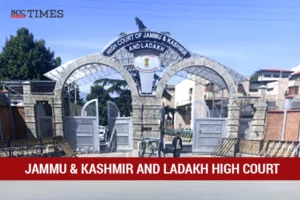Jammu and Kashmir High Court: In an appeal against the trial court’s order of conviction and sentence on the grounds that the trial court failed to comply with Section 342 of the Criminal procedure Code, 1989 [CrPC (J&K)] by not properly recording the statements of the accused and not informing them of their right to defense, a single-judge bench of Vinod Chatterji Koul, J., set aside the order of conviction and sentence imposed by the trial court and remanded back the matter to the trial court for further proceedings, with the directions to ensure compliance with the necessary legal procedures.
In the instant matter, on 31-05-2014, at around 2:00 PM, the victim, a resident of Ratnipora, was attacked with acid by the accused, resulting in severe burns to his face. The victim was immediately shifted to SMHS Hospital, Srinagar, for treatment. The police registered an FIR under Ranbir Penal Code (RPC). During the investigation, medical evidence supported the charges. The accused were arrested, and the case was committed to the Principal Sessions Judge, Pulwama. The trial commenced with the prosecution presenting 15 out of 43 listed witnesses. The defense did not lead any evidence, and the trial court convicted the accused based on the prosecution’s evidence. The appellants were subsequently sentenced. Aggrieved by the impugned order of conviction and sentence, the appellants preferred the present appeal challenging the same before this Court. The important question of law that arises for determination in the present is as to whether it is incumbent on the part of accused to spell out his defence including the plea of innocence at the stage of investigation, framing of charge while prosecution evidence is being recorded and at the stage of recording of statement under Section 342 of the Criminal procedure Code, 1989 [CrPC (J&K)].
The appellants argued that the trial court failed to properly examine the accused under Section 342 of the CrPC (J&K), which is analogous to Section 313 of the Criminal procedure Code, 1973 (CrPC), thereby, depriving them of a fair opportunity to explain the circumstances against them. This omission was claimed to be a serious irregularity that could potentially vitiate the trial. It was contended that the court did not inform the accused of their right to lead defense evidence, leading to a prejudiced trial.
The appellants asserted that the trial court did not correctly appreciate the evidence, as there were inconsistencies and contradictions in the testimonies of the prosecution witnesses. The appellants highlighted that they were not given an adequate opportunity to present their defense, which is a violation of their fundamental rights. The appellants further emphasised on their right to a fair trial, which includes the presumption of innocence and the opportunity to defend themselves. It was contended that the trial court’s actions infringed upon these rights, leading to a miscarriage of justice.
The Court examined whether the trial court had complied with the procedural requirements under Section 342 CrPC (J&K) and noted that the accused were not properly informed of their right to lead evidence in their defense, which is a crucial aspect of ensuring a fair trial. The Court recognized the serious procedural lapses in the trial court’s handling of the case, particularly concerning the examination of the accused under Section 342 CrPC (J&K). The Court reiterated that the purpose of Section 342 CrPC (J&K) is to enable the accused to explain any incriminating circumstances against them, which is vital for the integrity of the trial process and failure to properly examine the accused under this section may result in a serious irregularity that could vitiate the trial.
“The accused has a right to be provided an opportunity to adduce any evidence in support of his defence. This right of the accused is a very valuable right which cannot be curtailed in any way. Therefore, a heavy duty is cast upon the Court to see as to whether or not the defence evidence sought to be summoned, is necessary for defending the charge levelled against the accused.”
The Court also noted that Article 20(3) of the Constitution of India protects the right of an accused to silence and against self-incrimination. The prosecution must prove the guilt of the accused beyond reasonable doubt without compelling them to incriminate themselves.
The Court found that the procedural lapses and the resulting prejudice against the accused were serious enough to vitiate the trial. The Court set aside the order of conviction and sentence imposed by the trial court and remanded the matter to the trial court for further proceedings, with the directions to ensure compliance with the necessary legal procedures.
[Nazir Ahmad Mir v. State of J&K, 2024 SCC OnLine J&K 638, Decided on 22-07-2024]
Advocates who appeared in this case :
Mr. S. N. Ratanpuri, Ms. Fiza Khursheed and Ms. Minsha, Counsel for the Appellants
Mr. Zahid Qais Noor, GA, Mr. R. A. Jan, Senior Advocate with Mr. Suhail Mehraj, Counsel for the Respondent

